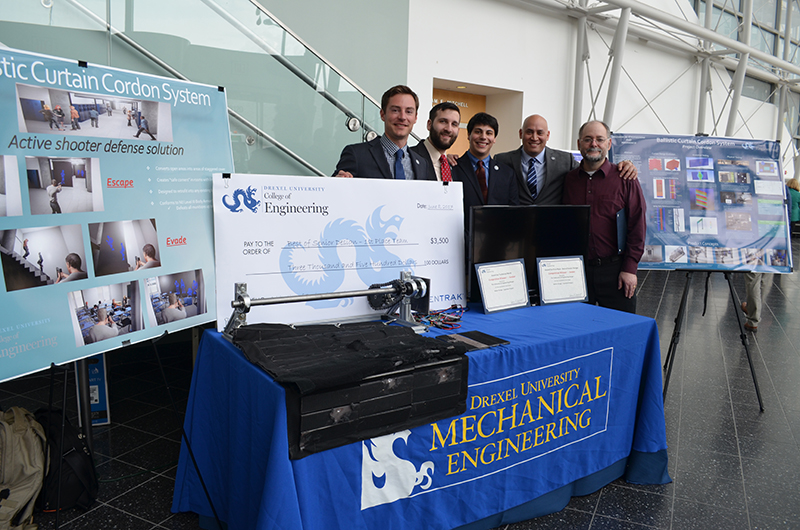 After several senior design teams presented projects to a panel of judges, three teams were recognized at the final awards ceremony during the last stage of the Senior Design Competition on June 8, 2017 in the Bossone Research Center. Here are the winners and the details of their projects:
After several senior design teams presented projects to a panel of judges, three teams were recognized at the final awards ceremony during the last stage of the Senior Design Competition on June 8, 2017 in the Bossone Research Center. Here are the winners and the details of their projects:
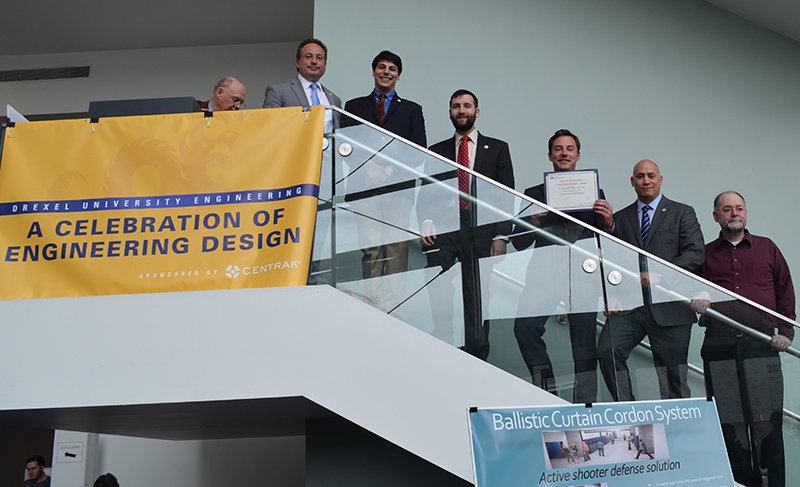 Technical Merit - $2,500 & Best of Senior Design 1st Place - $3,500
Technical Merit - $2,500 & Best of Senior Design 1st Place - $3,500
MEM-27: Ballistic Curtain Cordon System
Advisor: Dr. Christopher Peters
Team: Peter Lewis, Daniel Navin, James Ritchie Ostman, Fen Tamulonis
Incidents involving active shooters are an ever-growing concern. Mass shootings adversely affect the sanctity of communities and these atrocities influence all aspects of humanity and social order. Active shooter violence has been exhibited in settings such as schools, government offices, and centers of worship. As the frequency of these events escalate, trepidation exists among those who are tasked with ensuring security. Similar concerns are present in venues or areas where security is equally paramount. Examples include healthcare facilities, foreign embassies, and military installations. Given the volatile nature of these circumstances, methods must be implemented in order to mitigate the impact of mass shootings. A system designed around active shooter scenarios must function as an interruption to the offender. Equally, such systems should facilitate safe passage to possible victims. A proposed method of abating active shooter developments would instantly compartmentalize areas of wide exposure with ballistic resistant barriers. The Ballistic Curtain Cordon System offers the solution to fulfill these requirements. The system is being developed as a retrofit for current establishments. Analytical and physical prototypes have been created and tested, showing promising results for the effectiveness of the system.
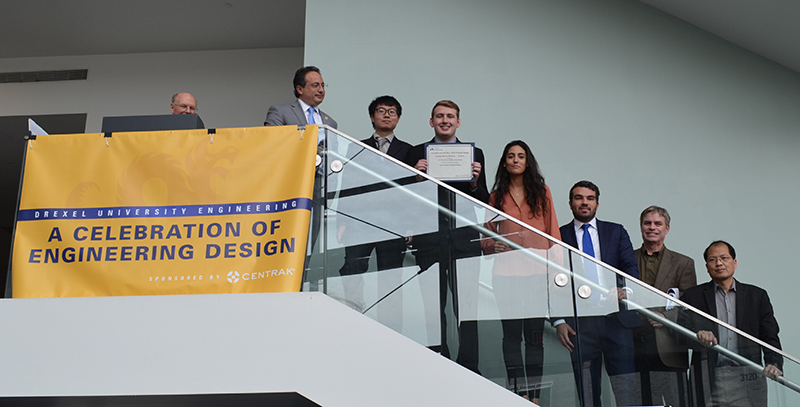 Best of Senior Design 2nd Place - $2,000
Best of Senior Design 2nd Place - $2,000
ET-06: Combined Algae Bioreactor Solar Cell Array For Biofuels And Photovoltaic Electricity
Advisor: Dr. M. Mauk and Dr. R. Chiou
Team: Ainhoa Garcia Echevarria, Jean Espaillat, Robert Surette, Senyu Wang
The idea of creating biomass from algae, which could be converted into biofuels, was investigated, but deemed economically non-viable as higher algae yields from sunlight are needed. We developed a hybrid system combining photovoltaics and photobioreactors to grow algae in a more efficient manner by modulating the sunlight. The project is mainly focused on proving the theory that algal biomass production can be made more efficient with an intermittent light. The algae flow in channels in a circulating loop; solar cells are arranged over the channels, such that the algae are periodically exposed to sunlight with space between them so that the circulating algae receive this intermittent light pattern. The attractiveness of the project is that algae can produce 2 to 20 times more fuel than corn or other similar crops and algae can double in size every six hours. Our system can be scaled up to produce large quantities of algae. During testing algae were grown in a tank simulating the open environment of a static pond and then using the closed system of the prototype. Weighing the biomass obtained from both environments have helped to determine that algae grow faster by imposing them to higher frequency intermittent lighting patterns.
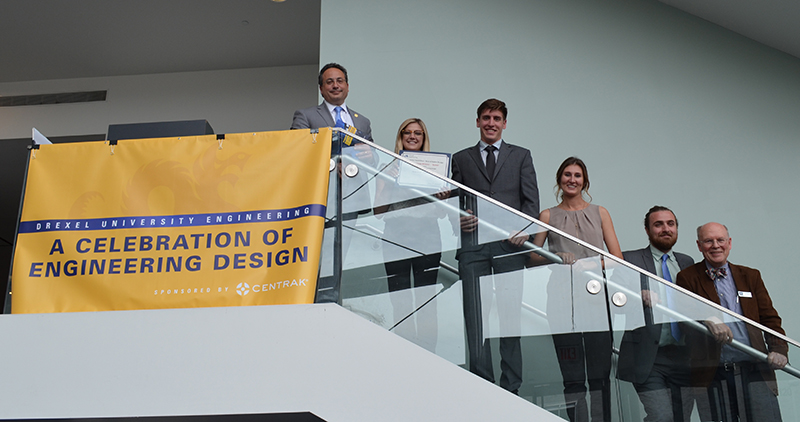 Best of Senior Design 3rd Place - $1,000
Best of Senior Design 3rd Place - $1,000
CAEE-11: Drexel Sprout Center
Advisor: Prof. James E. Mitchell
Team: Matthew Cimino, Ajani Curwen, Patrick Gillen, Kerri May, Mary Nelson
Fusing Drexel’s mission of experiential education with the innovative development of Schuylkill Yards; it is Rhyme One’s goal to provide the symbolic bridging of the Drexel University student to the professional world. The concept of the Sprout Center is to enhance the cooperative educational experience by allowing students the space to develop their own ideas and businesses with real-world professionals occupying the same space. The Sprout Center is a 200,000-square foot, 7-story, building located on the corner of Market St. and John F. Kennedy Boulevard. The Sprout Center offers leasable office spaces for students and professionals to develop their companies and better their careers. In addition to its leasable tenant spaces, the Sprout Center contains a mechanical parking garage, commercial space, recreational space, and additional space for the development of the Steinbright Career Development Center. Along with its unique exterior aesthetics, the main attraction of the building is the Sprout Walk. This cantilevered grand stairway along the exterior of the structure leading to a roof terrace promotes active living among students and tenants while offering quality views of downtown Philadelphia. As Schuylkill Yards is the future of Philadelphia, The Sprout Center is the future of Drexel University.
In addition, two freshmen awards were also distributed:
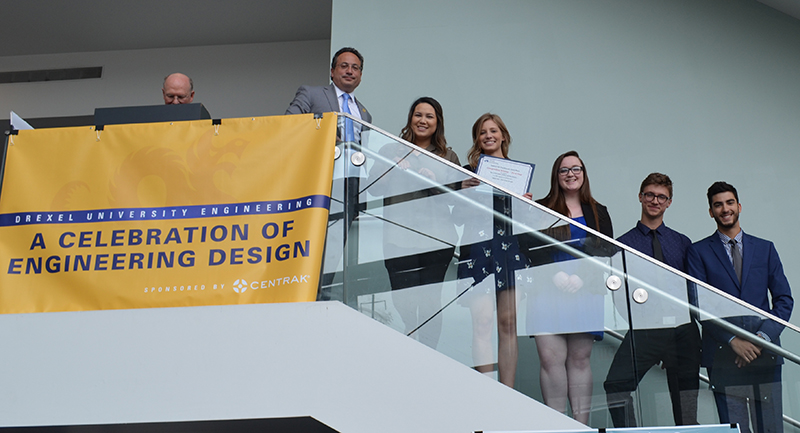 1st Place - $2,000
1st Place - $2,000
Team 61-15: Materials McGuyver
Advisor: Dr. Richard Knight
Team: Mika Awai, Jean-Luc Cassagnol, Anna Clare Desch, Mark Petrovic, Kirstin Snodgrass
Created a demonstration on the topic of thermal expansion for the use in STEM-related outreach events to get kids excited about science and engineering and educate them about the relatively esoteric field of Materials Science and Engineering.
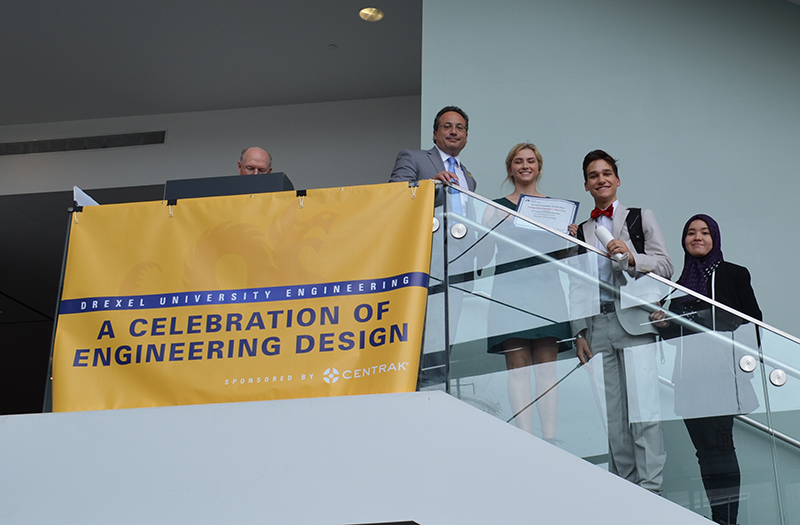 2nd Place - $1,000
2nd Place - $1,000
Team 77-1: Generative Design: Orthopedic Cast
Advisors: Dr. Antonios Kontsos, Daniel Christe, and Allon Guez
Team: Alaa Alam, Douglas Gerichten, Maria Zhdankina
Designed a breathable, lightweight, waterproof, and patient-specific leg cast using cloud-integrated reality capture and generative product design tools.
The Senior Design three-course sequence is intended to simulate a professional work environment, to provide experience working in a group on an open-ended problem and to develop information gathering and communication skills. Substantial interaction between students, faculty and industrial and governmental institutions is an integral part of this experience. For more details on the competition, click here to visit the official site and view the runner-up design projects.